If you’re a cat owner, there’s a good chance you’ve heard the dreaded sound of claws dragging across your door. It’s not music to your ears; it’s your feline friend exercising their natural desire to scratch, often at the expense of your doors’ appearance and integrity.
Scratching is not just a quirky habit—it’s embedded in cat DNA, part of their grooming ritual to shed old claw sheaths and keep those predatory paws sharp.
But here’s something interesting—cats also use scratching as a way to communicate. By leaving visible marks and releasing scent from special glands on their paws, they’re essentially making that spot their own personal billboard.
Our article zeroes in on this feline behavior and offers solutions tailored for pet owners like you who adore your furry companions but value intact doors just as much.
From preventative measures to creative redirection techniques, we lay out actionable steps that help maintain peace between your kitty’s instincts and your home aesthetics.
Key Takeaways
- Cats scratch doors for attention, curiosity, or to mark their territory. You can help by giving them toys and times to play.
- To keep cats from scratching doors, trim their nails, use sticky tape on the door, and give them other things like scratching posts to scratch.
- Making a quiet place for your cat with beds and toys or using smells they don’t like can stop them from scratching doors.
- Feeding your cat before bed can make them sleepy and less likely to scratch at night.
- If your cat keeps scratching doors after trying these tips, you might want to talk to a vet for more help.
Understanding Why Cats Scratch Doors
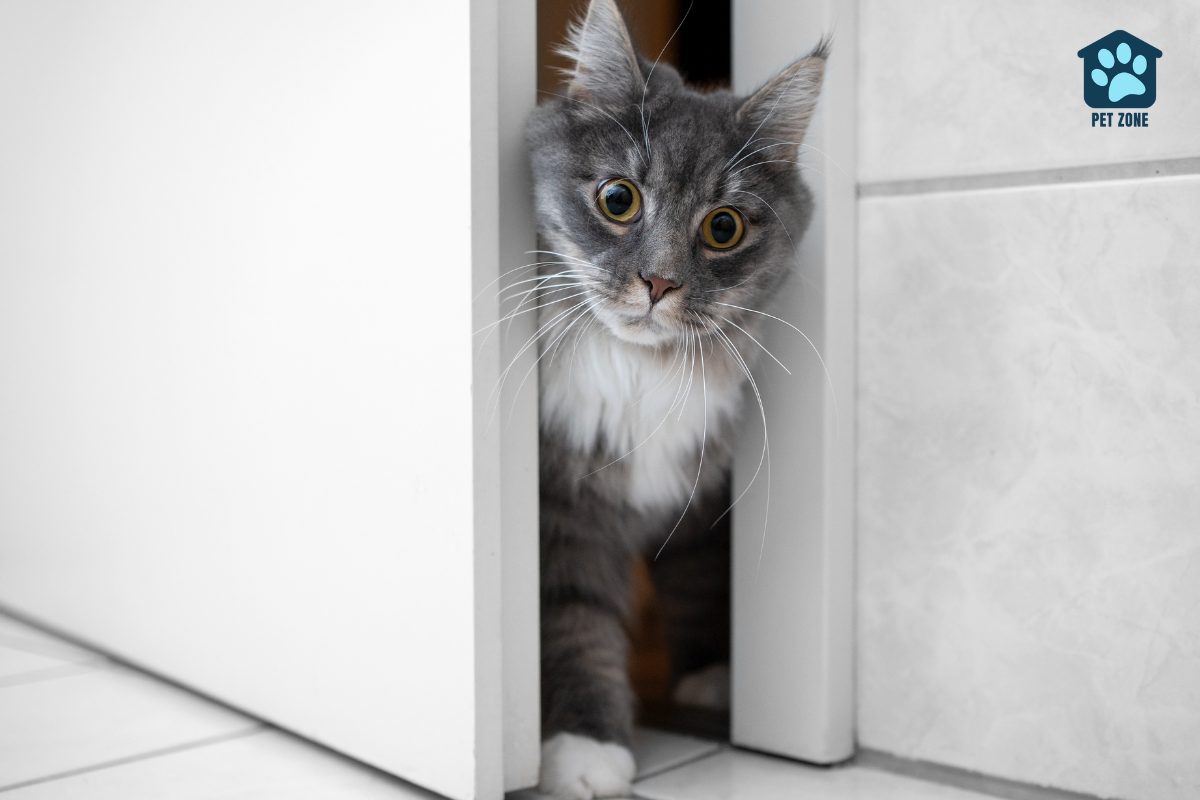
Attention-Seeking Behavior
Cats scratch doors to get your attention. They might feel lonely or just want some playtime with you. If your cat is scratching to say “look at me,” it’s important to respond but not by opening the door every time they scratch. This could teach them that scratching works to get what they want.
Instead, set aside regular times for cuddles and games with your cat. Try using cat toys or a play session as a reward when they use their scratching post instead of the door. These fun moments can help stop the unwanted door-scratching and make your furry friend happy!
General Curiosity
Cats have a built-in urge to explore and understand their world. This includes what’s on the other side of doors, especially closed ones! Your cat may scratch at the door just wanting to see what’s there or because they smell something interesting.
Think about how your kitty sees it: if you’re in one room and they’re in another, that door is all that stands between them and being close to you. They might scratch as a way to say, “Hey, let me join you!”
Or maybe they hear noises from the outside or sense another pet through the gap under the door. Their curiosity kicks in—they need to investigate!
Giving your cat toys can keep their mind busy so they don’t feel the pull of those mysterious sounds and smells as much. When your cat has fun things to do, like chasing a ball or pouncing on a plush mouse, scratching at your bedroom door becomes less tempting.
Set up a comfy spot with some look-out points away from doors where they can hang out—your furry friend will love having places where they can watch over their kingdom without getting into trouble!
Territorial Issues
Just like they’re curious, cats are also very territorial animals. They use scratching to mark their spaces and show other pets “this is mine!” Your door might be right on the edge of their claimed area, so they scratch it to leave their scent and a visible sign for others.
To help your cat feel secure in its territory without ruining doors, give them lots of things they can call their own. Scratching posts close to the door or cat trees in that area can let them claim space safely.
When you see your cat using these spots instead of the door, offer treats or playtime as rewards. This positive reinforcement tells them “good job” for picking the right spot!
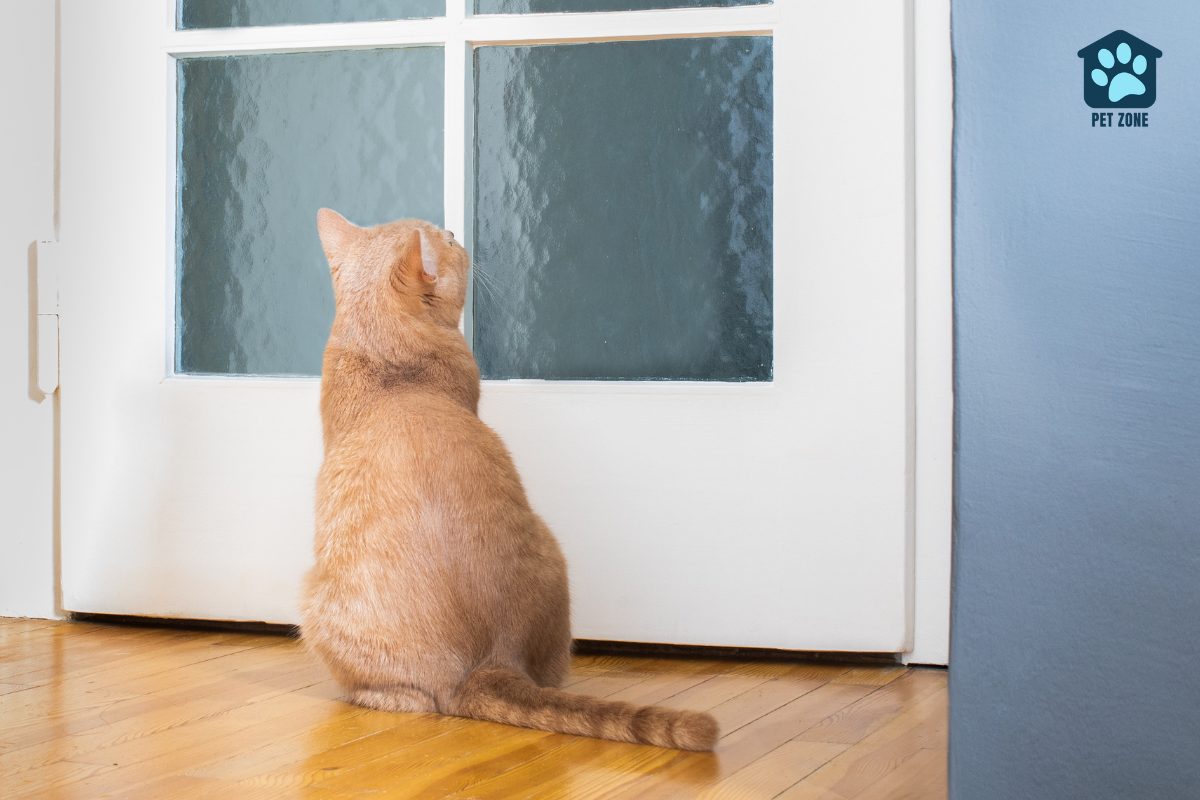
Preventative Measures to Stop Your Cat from Scratching Your Doors
Keep Your Cat’s Nails Trimmed
Keeping your cat’s nails trimmed is an essential way to reduce their desire to scratch at doors. By regularly trimming their nails, you can minimize the damage they can do when scratching and make it less appealing for them to engage in this behavior.
Shorter nails also mean that even if they do scratch, it will be less destructive. This practice reduces the sharpness of their claws, making it less satisfying and effective for them to engage in door scratching.
Provide Scratching Pads and Posts
To prevent your cat from scratching doors, provide scratching pads and posts to give them an appropriate outlet for their natural behavior. Scratching pads and posts can help fulfill your cat’s need to scratch while also protecting your doors and furniture.
If you’re looking for a sturdy, well-design scratching post for your cats, check out this best seller!
The SmartCat Ultimate Scratching Post will stand up to your cat’s claws, less snagging like carpet or furniture fabrics. The sturdy design of the scratching tower allows kittens and cats of all sizes to fully stretch when they scratch.
Satisfy your indoor cat’s natural urge to scratch and protect your furniture while your cat gets in their exercise and stress relief.
- Easy setup
- Durable no-snag sisal fiber
- Sturdy design with neutral colors
By placing these items in key locations around your home, you can encourage your cat to scratch them instead of your doors. Additionally, consider using sisal or cardboard scratching pads as they are often more appealing to cats and can effectively redirect their scratching behavior away from the doors.
Offer More Stimulation
To prevent your cat from scratching doors, it’s essential to offer more stimulation. Cats need mental and physical activity to keep them engaged and curb their scratching behavior.
Interactive toys, puzzle feeders, and regular play sessions can help fulfill your cat’s natural hunting instincts while keeping them entertained. You can also provide climbing structures or window perches to give your cat a sense of territory and keep them mentally stimulated.
Moreover, rotating your cat’s toys regularly can maintain their interest and prevent boredom-induced door scratching. Engaging in interactive play like feather wands or laser pointers can redirect their energy towards appropriate activities rather than scratching at doors.
Distract The Cat With Catnip
Catnip can be a great distraction for your cat when they are tempted to scratch doors. The scent of catnip triggers a temporary euphoric reaction in most cats, making it an effective tool for redirecting their attention away from the door.
You can use catnip on scratching posts or toys to encourage your cat to focus their scratching behavior on these designated items instead of the doors. By providing this alternative and enjoyable activity, you can help deter your cat from damaging your doors while keeping them entertained.
Moving forward, let’s consider another effective method to prevent door scratching – “Provide a Calming Environment Elsewhere”.
Provide a Calming Environment Elsewhere
Create a peaceful and comfortable space in your home for your cat to relax, away from the doors they tend to scratch. Place their bed, toys, and favorite resting spots in this area. Ensure it has low foot traffic and is free from loud noises or disturbances.
You can also use calming aids like pheromone diffusers or soft music to promote a tranquil atmosphere. Additionally, consider incorporating interactive toys or puzzle feeders to keep your cat engaged and mentally stimulated.
All these measures help divert their attention away from the doors, reducing the urge to scratch.
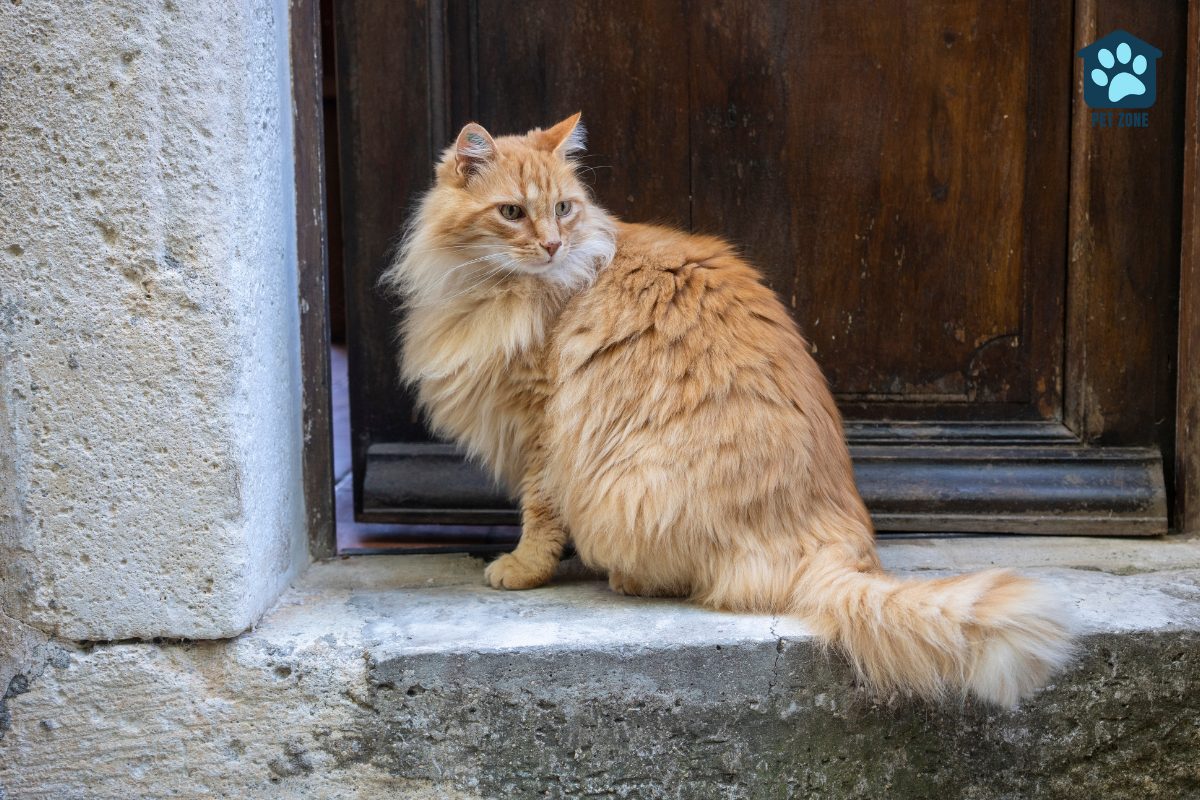
Feed Your Cat Before Bedtime
Feeding your cat before bedtime can help reduce their nighttime activity, including scratching at doors. This is because a full belly may make your cat more inclined to settle down and rest during the night.
Additionally, scheduling regular meal times can create a sense of routine for your cat, which can help regulate their behavior and reduce unwanted activities like door scratching.
Use of Deterrents like Double-Sided Tape
To deter your cat from scratching the doors, using double-sided tape can be effective. Cats don’t like the sticky feeling on their paws, so they are less likely to scratch where the tape is placed.
This simple deterrent can help protect your doors and redirect your cat’s scratching behavior to more appropriate surfaces, such as scratching posts or pads.
Additionally, by applying double-sided tape to the areas where your cat frequently scratches, you can discourage this behavior without causing any harm to your feline friend. It’s a safe and practical way to modify their behavior and protect your furniture and doors from unwanted claw marks.
Spray Cat-Deterring Essential Oils
Cat-deterring essential oils can be an effective way to discourage your cat from scratching doors. Certain scents like citrus, lavender, or eucalyptus are known to repel most cats. You can mix a few drops of these essential oils with water and spray the solution on the door where your cat tends to scratch.
Using essential oils as a deterrent is safe for both your cat and your furniture. It provides a natural way to redirect their scratching behavior without causing any harm.
Additionally, essential oils offer a pleasant aroma for humans while keeping cats away from specific areas in the house, making them an eco-friendly option for preventing unwanted scratching behaviors.
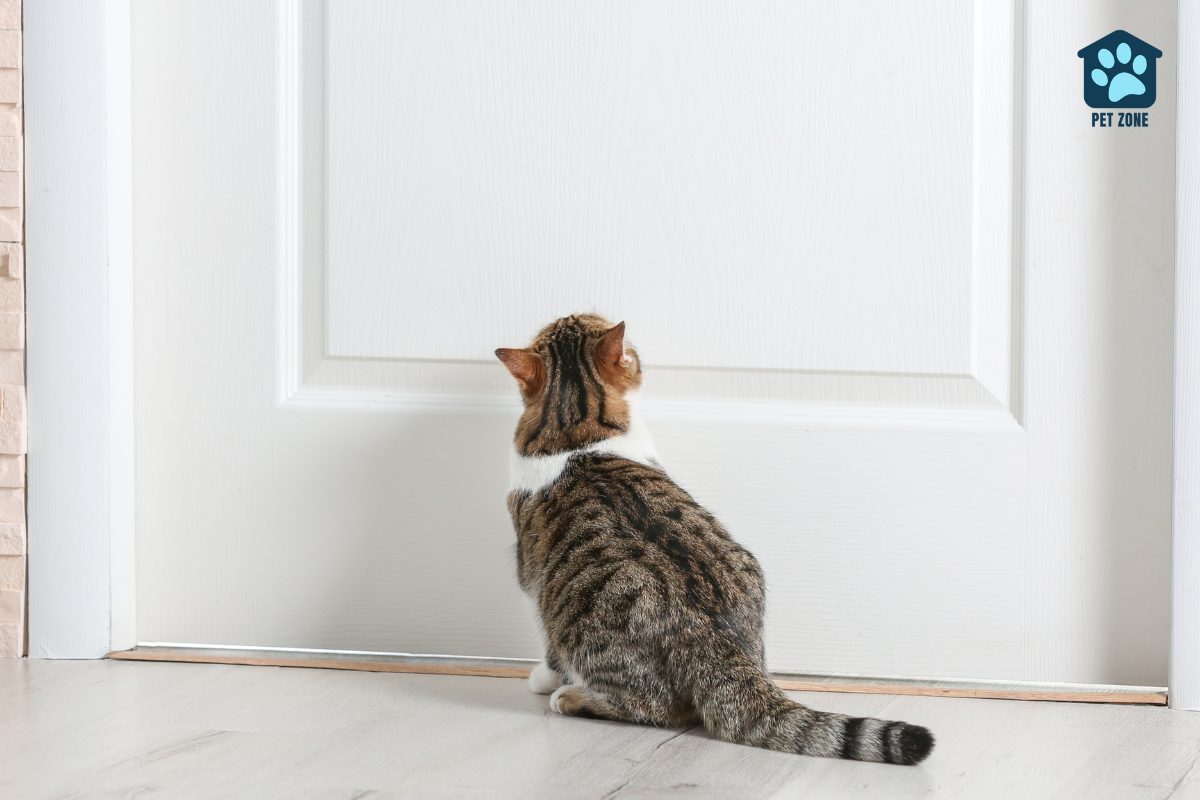
Conclusion
Understanding why cats scratch doors is the first step to stopping this behavior. By implementing practical measures like keeping nails trimmed and providing scratching posts, you can effectively discourage door scratching.
These strategies are easy to implement and can lead to significant improvements in your cat’s behavior. For further guidance, consider consulting a vet for underlying issues or exploring additional resources on cat behavior.
Remember, with patience and consistent application of these tips, you can create a harmonious environment for both you and your feline friend!
Frequently Asked Questions
Your cat may be scratching your door because it wants attention, is bored, or just loves to scratch as a natural behavior. Sometimes, cats scratch to mark their territory with scent glands in their paws.
You can teach your cat to stop this behavior by placing a scratching post near the door they like to scratch and rewarding them when they use it instead of the door frame.
Try feeding your cat before bedtime and make sure they have enough toys to keep them entertained. If your cat just wants to be near you, let them sleep in your room – but set clear rules about scratching.
Using a spray bottle might stop a cat from scratching temporarily, but it’s not a long-term solution and could harm your relationship with your pet. Positive reinforcement techniques are better for teaching good habits.
Yes! Some owners find success using essential oils—make sure the oils are safe for cats—or double-sided tape on doors; cats don’t like the sticky feeling on their paws.
Absolutely! You can buy flat hanging scratchers that attach directly onto the doorknob or nearby wall space which provide something for your kitty to dig into other than your actual door.
As an Amazon Associate I earn from qualifying purchases.
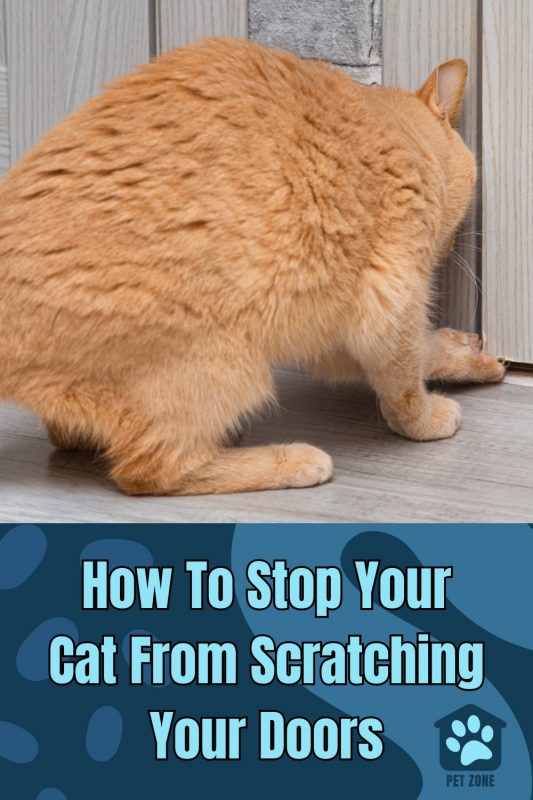


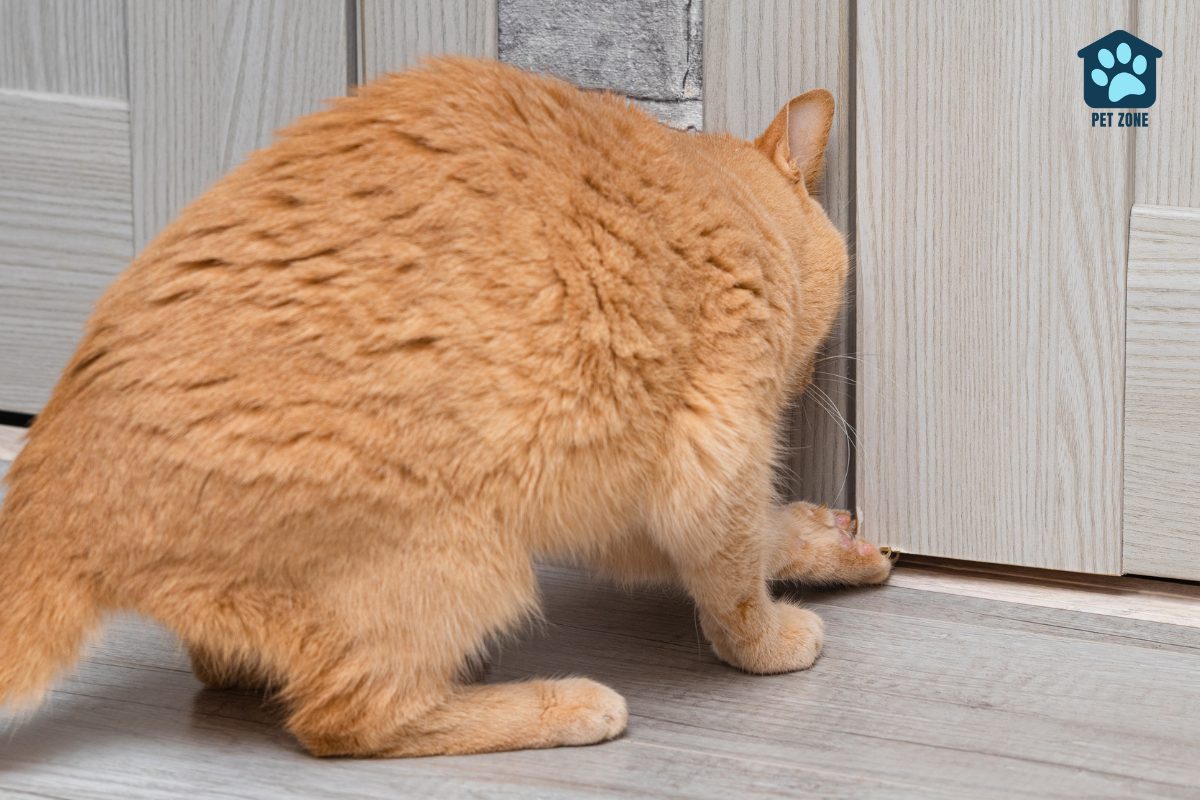
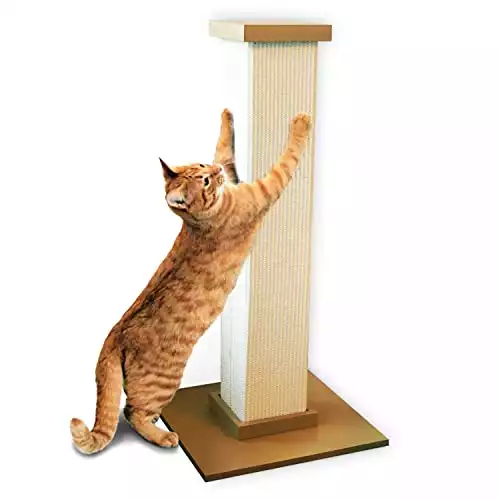
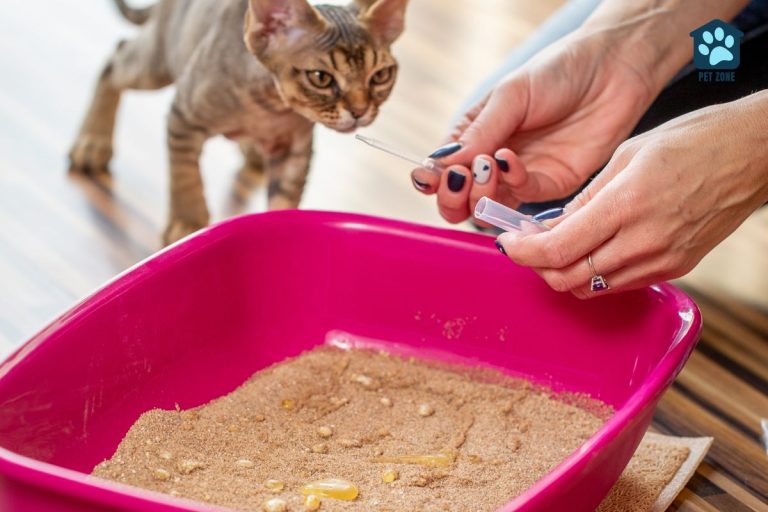
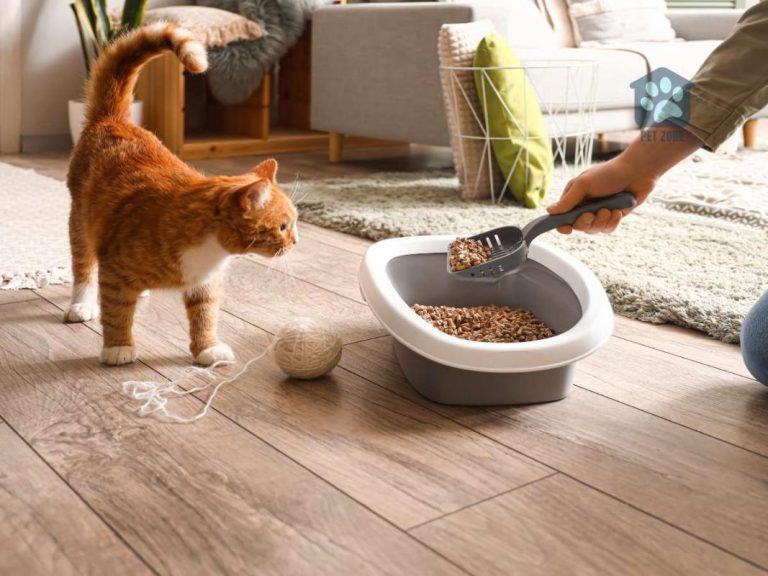



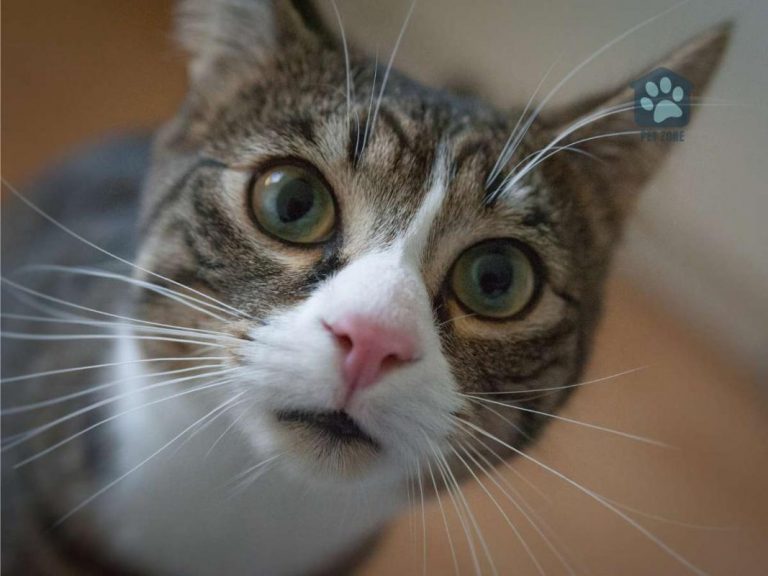
This is so helpful! I had no idea scratching could also be a way to communicate. And all your suggestions are so helpful!